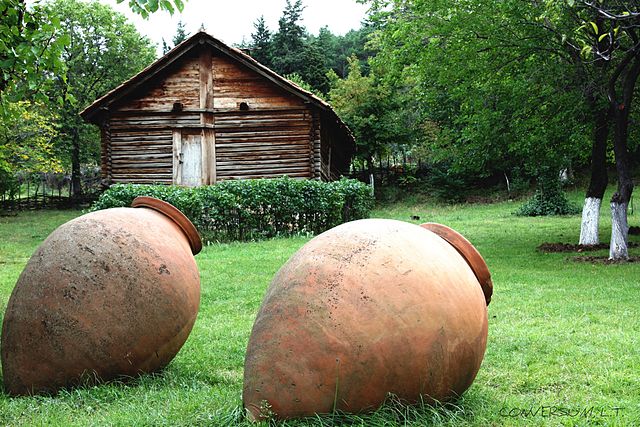Eight-thousand-year-old pottery shards found in Georgia point to evidence of the world’s earliest grape wine-making, according to scientists.
The earthenware jars were found in two sites south of Tbilisi, Georgia’s capital, and contained residual wine compounds, the BBC reports. Some of the jars had images of grapes and a man dancing.
Before this find, the earliest traces of wine-making were in pottery dating back to some 7,000 years ago, dug up in northwestern Iran, in the Zagros Mountains.
Stephen Batiuk, a senior researcher at the University of Toronto and co-author on the study, said,
We believe this is the oldest example of the domestication of a wild-growing Eurasian grapevine solely for the production of wine.
He explained, “Wine is central to civilization as we know it in the West. As a medicine, social lubricant, mind-altering substance and highly valued commodity, wine became the focus of religious cults, pharmacopoeias, cuisines, economies and society in the ancient Near East.” The jars were found in the Neolithic villages of Gadachrili Gora and Shulaveris Gora, the oldest among them dating back to about 5980 B.C.
Large jars called qvevri, similar to these excavated ones, are still being used for modern-day wine-making in Georgia, according to David Lordkipanidze, director of the Georgian National Museum. Lordkipanidze helped with the research. Batiuk said that the ancient wines were probably made in the same manner as that which uses the qvevri today, “where the grapes are crushed and the fruit, stems and seeds are all fermented together.”
In 2011, a wine press and some fermentation jars from around 6,000 years ago were found in a cave in Armenia, proving that wine-making is an ancient process.
The world’s oldest non-grape wine is believed to be a fermented drink made of rice, honey and fruit, found in China and dating back to around 7000 B.C.
The study was published in the Proceedings of the National Academy of Sciences (PNAS).
























